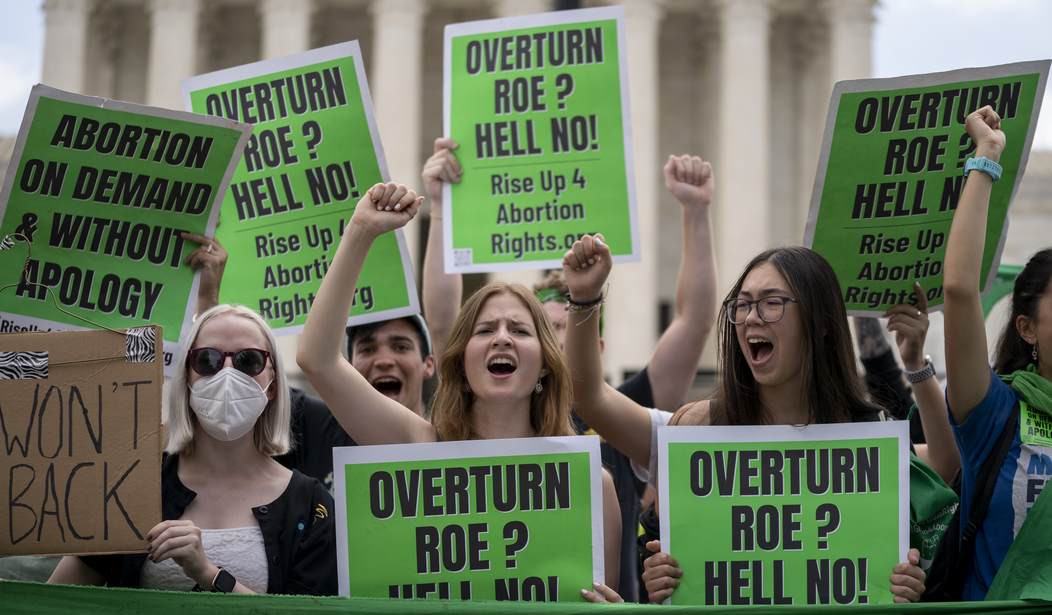Since Roe v. Wade was overturned, countless articles have been written about the Supreme Court’s wildly unpopular assault on democracy. The primary evidence for this claim is that decades of polling—including polls that I have conducted—have shown that a solid majority of voters didn’t want Roe overturned.
Years of polling data also shows that a solid majority of voters want abortion to be legal all or most of the time. My latest numbers show that 56% of voters hold this view. Another 27% say it should be illegal most of the time, but legal some of the time. In other words, 83% think abortion should be legal at least under some circumstances. Only 9% say it should always be illegal and 7% are not sure.
To many elite pundits, these numbers are proof that the Court is imposing a radically unpopular agenda on the nation. The conventional wisdom in official Washington is that overturning Roe will help the Democrats in the midterm elections, the only question is how much.
But there’s much more to the story, including the possibility that the abortion issue may end up hurting Democrats in some close races this year.
In a poll conducted after Roe was overturned, my firm found that just 24% of voters thought it was too hard to get an abortion in America. Forty percent (40%) said it was too easy. Those numbers are pretty much the same as they were before Roe was overturned. On this point, nothing changed.
How can you reconcile those numbers with the decades of polling showing that most voters oppose the overturning of Roe? It turns out that polling on Roe is not a very reliable measure of anything. In a poll conducted earlier this year, 41% of voters thought overturning Roe would make abortion illegal in the United States and another 36% weren’t sure. Just 22% recognized that overturning Roe would not make abortion illegal.
Recommended
If people didn’t understand what overturning Roe would mean, one logical conclusion is that all the polling asking about the overturning of Roe is meaningless. Another might be to think of how survey respondents interpreted the question-- perhaps the polling on Roe simply confirms the fact that most voters are opposed to a complete ban on abortion.
By the way, even after the decision overturning Roe was released, just 51% recognized the ruling does not ban abortion.
At this time, a more relevant question to consider is why does a plurality of voters think it’s too easy to get an abortion? The answer can be found by looking at abortion laws currently in place. According to data from the Guttmacher Institute—an organization committed to advancing sexual and reproductive rights—62% of Americans live in states where the abortion laws are more lenient than the public supports.
Seven percent (7%) of Americans live in states where abortion is allowed up to the moment of birth. Only 18% of voters think that is appropriate. Another 55% live in states where abortion is legal well into the second trimester of a pregnancy. Sixty-one percent (61%) of voters favor limiting abortion to the first trimester only.
This reality helps explain why voters, by a 40% to 24% margin, think it is too easy to get an abortion. Seventy-six percent (76%) of voters think that it’s important to preserve a woman’s right to choose, but that choice should be made early in the pregnancy. Even among voters who say abortion should be legal most or all of the time, just 34% believe it should be allowed after the first trimester of a pregnancy.
In raw political terms, this opens a huge opportunity for candidates whose views are in line with public opinion. Given a choice, 57% would prefer a candidate who thought abortion should be allowed only during the first 15 weeks of a pregnancy over one who favored allowing abortion up until the moment of birth. Just 24% would prefer the abortion at any time candidate.
That voter preference for a more moderate stance on abortion is a potential problem for Democrats this November. Thanks to Senate Majority Leader Chuck Schumer, every Democratic Senator up for re-election this year voted for a bill that allows abortion up until the moment of birth. Not only that, they’re also on record banning modest restrictions that are extremely popular such as parental notification and brief waiting periods.
As a practical matter, however, the abortion issue probably won’t have much of an electoral impact. The debate may increase turnout on both sides of the aisle, but inflation and other economic concerns are likely to remain the decisive issues. But in a close race where every vote counts, Democrats have left themselves vulnerable on an issue where they are out of step with public opinion.

























Join the conversation as a VIP Member